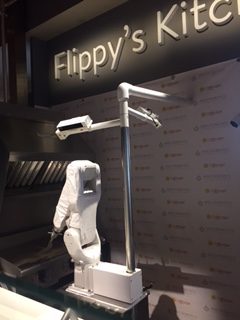Who is going to be first in line to buy if Elon Musk is able to build a humanoid robot in the future? A best guess would be owners of the California companies whose businesses are threatened by the state’s steep minimum wage and other costs heaped on them by Sacramento.
No prototype yet exists – Musk says one will be ready sometime next year – but if the idea ever reaches the production stage, the robots will be prepared to take on “dangerous, repetitive, boring” jobs, he says. Imagine that. A worker whose wages aren’t artificially inflated by public policy; who doesn’t require his or her employer to pay for health care, workers’ compensation and unemployment insurance; whose productivity doesn’t waver; who won’t join a union, doesn’t complain, never arrives late, and is unlikely to pack up and leave California because it’s too expensive to live here.
Replacing humans with robots is inevitable. We’ve already seen self-checkouts at retail stores, and ordering kiosks at restaurants. But now machines are performing more complex work. A few years ago, a Pasadena restaurant “hired” an “employee” that simply went by the name Flippy to cook its burgers. Though he was the world’s first – and therefore most famous – automated grillmaster, Flippy was “fired” after one day on the job by CaliBurger because he needed new coding to keep up with the unexpected demand for burgers cooked by a robot. He didn’t claim to be the victim of discrimination or contend that the terms of his contract had been violated. He left peacefully and readily submitted to being retooled.
When the new and improved Flippy returned to work a couple of months later in May 2018, he was moving “like a ninja” and was “more reliable,” said David Zito, CEO of Miso Robotics, the company that built him. Flippy 2.0 followed in the summer of 2018, “cooking hamburgers,” and operating “a full-fledged frying machine after going through a pilot program at Dodger Stadium,” according to The Spoon, which covers the food tech revolution.
Robots are also making pizza, French fries, and, in at least one location, cooking burgers under the control of customers. They also build cars. Maybe the Tesla robot, since it will be bipedal and look like a person dressed up for Halloween, will vacuum carpets, mop floors, load the dishwasher, and mow the lawn, even stock store shelves while keeping perfect track of inventory in its head.
For some, the prospect of robotics displacing workers is frightening. But that’s not what they should be scared of.
“Don’t fear automation … fear the minimum wage,” reads a headline in Chicago Booth Review published by the University of Chicago Booth School of Business.
That article was written in 1965. But its lessons are still applicable today. A rising minimum wage forces companies to boost their investments in automation and accelerates the implementation of robotics.
Please don’t infer from any of this that we’re anti-automation. Far from it. We agree with Yale Brozen, the Booth School of Business professor of business economics who wrote that 1965 article, and concluded that “automation should be welcomed as the means of alleviating poverty” and repairing “the damage done by bad wage laws and improper union-employer agreements.”
“It should not be feared as a job destroyer,” Bronze said. “It is a job creator.”
But we do oppose government meddling in employee-employer relationships. There’s no sense in destroying jobs, which minimum-wage laws do even if there are no machines to take the place of workers who lose their income when wage floors price them out of the job market.
Despite the harm they cause, policymakers set minimum wages anyway. It’s the same sort of cramped thinking that would produce legislation aimed at stopping businesses from replacing workers with machines.
Kerry Jackson is a fellow with the Center for California Reform at the Pacific Research Institute.

